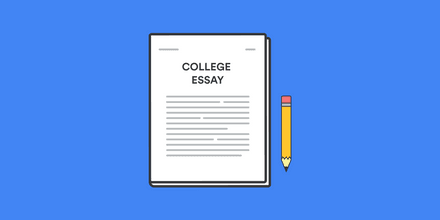
What is academic writing? In this post, we define academic writing, explore the different types of academic writing, and offer tips for getting it right.
What is academic writing?
Academic writing refers to the formal type of writing that is used in schools and other research institutions. It follows specific conventions, depending on the nature of the assignment and the topic area.
The most significant features of academic writing are its objectivity and use of scholarly evidence with citations. Unlike personal forms of writing (like biographical essays and personal statements), academic writing approaches its subject from an objective, rather than subjective, stance.
Each type of academic writing has its own standards and conventions, so it’s important to consult the assignment’s guidelines or rubric before you get started.
Types of academic writing
Academic writing can be divided into two basic categories: writing that is completed in an educational setting (like essays, research papers, and annotated bibliographies) and writing that is published or presented in a professional setting (like journal articles and scholarly books).
Academic writing assignments
Argumentative essay
An argumentative essay takes a stance on an issue and presents an argument that defends that stance through evidence and analysis. Many of the academic writing assignments that instructors assign fit under this label.
Exploratory essay
An exploratory essay considers a topic or problem and explores possible solutions. This type of paper also sometimes includes background about how you’ve approached the topic, as well as information about your research process.
Annotated bibliography
An annotated bibliography is a list of references that includes a brief summary of each source and an assessment of its merit or usefulness to your research topic. In order to successfully complete an annotated bibliography, you need to carefully read the scholarly sources that you are exploring.
Research proposal
A research proposal explains what issue or problem you plan to investigate for your research paper. It can be a short, one-page document that briefly explore your overall topic and argument or it may be a more formal, multi-page assignment with distinct components.
Literature review
A literature review is a summary of the major sources on a chosen research topic. Unlike an annotated bibliography, a literature review is typically part of a longer paper.
The aim of the literature review is to put different sources into dialogue with each other by identifying points of agreement or disagreement between scholars. Most literature reviews include direct quotes from the sources that are being cited.
Research paper
A research paper requires you to make a major claim about a topic and then to back up that claim with evidence found through your thorough research. Research papers are very similar to argumentative essays because both forms extend from an argumentative thesis statement.
Thesis or dissertation
Theses or dissertations are longer form works that sustain a research-based argument across multiple chapters. This type of academic writing is most common in graduate-level programs.
Lab report
A lab report covers the aims, methods, results, and conclusions of an experiment. You’ll encounter lab report assignments in science classes.
Published academic writing
Scholarly article
Scholarly articles, also known as journal articles, are essay-length publications that make arguments, present research, and draw conclusions about an idea, problem, or text. You may read scholarly articles for a class assignment or while conducting your own original research.
Scholarly monograph
A scholarly monograph is a single-authored book that makes an argument and presents research over several chapters. Sometimes a monograph incorporates material from previously published scholarly articles. Monographs and other types of academic books provide more in-depth information on a topic than articles.
Edited volume
Edited volumes are academic books that include multiple argumentative essays about different aspects of a topic. Each of the essays presented in an edited volume have a different author. These essays are very similar to scholarly articles, except they are published as part of book instead of a journal.
Conference paper or poster
An academic conference is an event in which scholars present their current research on a specific topic or field. At conferences, scholars may read out a short paper or demonstrate their research in a carefully organized poster. These works are sometimes made available online or through scholarly publications like conference proceedings.
Academic writing tips
1. Be objective, but use “I”
Academic writing should be objective rather than personal, but this doesn’t mean that it needs to sound mechanical. While you shouldn’t write in an overly conversational tone, or use “you,” it is perfectly fine to use “I,” as in “I argue that…”
2. Be clear, concise, concrete, and correct
Good academic writing isn’t overly rigid or full of jargon. Rather, you should strive to use language that is clear, concise, concrete, and correct.
To ensure clarity, use as few words as possible to make a point. It’s a myth that academic writing needs to be wordy or full of “big words.” Make concrete claims that are backed up by evidence and analysis. Finally, check that your grammar and spelling is correct.
3. Follow the guidelines for format and structure
Each academic writing assignment will likely have its own specific guidelines about format, structure, and organization. Depending on what type of paper you’re writing, you may need to include a title or cover page, headers, or other formatting features.
Additionally, some types of academic writing—like research papers—have a specific structure. A typical research paper will have an introduction, literature review, evidence and analysis sections, and a conclusion.
4. Ensure that your citations are correct
One of the main features of academic writing is citations and it’s important to include correct in-text and bibliographic citations in your work. Use BibGuru’s citation generator to create accurate, paper-ready citations for academic writing assignments.
5. Plan time for revision and proofreading
Always plan to set aside dedicated time for revision and proofreading when you’re completing an academic writing assignment. Usually, you need at least a few days to read over your entire paper, make substantive revisions, and conduct a final proofread before submission.
Frequently Asked Questions about what is academic writing
🐞 What is academic writing?
Academic writing refers to the formal type of writing that is used in schools and other research institutions.
🎩 What are the main features of academic writing?
Academic writing is objective, uses clear, concise, correct, and concrete language, and includes accurate citations for all borrowed materials.
🌈 What are some examples of academic writing?
Some examples of academic writing include argumentative essays, research papers, lab reports, and annotated bibliographies.
🌎 What is the first step in academic writing?
Before you sit down to write an academic paper, consider making an outline that includes the main points that you want to make and a framework for how you want to organize your paper.
🍭 How can I improve my academic writing skills?
The best way to improve your academic writing skills is to practice! You can practice by reading academic works, like journal articles, and by writing regularly.


